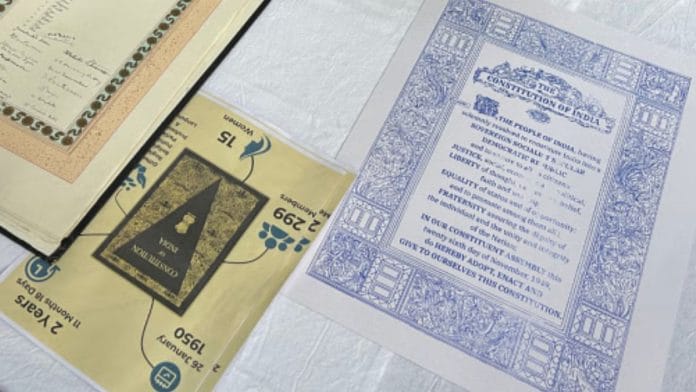Thank you dear subscribers, we are overwhelmed with your response.
Your Turn is a unique section from ThePrint featuring points of view from its subscribers. If you are a subscriber, have a point of view, please send it to us. If not, do subscribe here: https://theprint.in/subscribe/
The Preamble of the Indian Constitution encapsulates the core values of our nation, the vision of a sovereign, socialist, secular, and democratic republic. The recent call by Rashtriya Swayamsevak Sangh (RSS) general secretary Dattatreya Hosabale that ‘secular’ and ‘socialist’ must be removed from the Preamble challenges the very ideals of our Constitution.
While the demand for such removal is not new, the argument in its favor remain constant, that these words were added during the emergency era. Thus, it becomes necessary to ascertain its legality and whether the supreme law of our country, allows for such a removal.
A Historical Dive
The words ‘secular’ and ‘socialist’ were added to the Preamble through the 42nd Amendment Act in 1976, while the dreaded Emergency period was ongoing. Though inserted later on, these words do not introduce any new principles to the Preamble, rather they make concrete and explicit the ideas already imbibed in our Constitution.
Articles 25 to 28 guarantee right to freedom of religion, a Fundamental Right, ensuring against unwarranted interference from the State. This essentially implies that the idea of secularism is already promoted through fundamental rights. According to Granville Austin, Directive Principles of State Policy set forth the humanitarian socialist precepts that were the aims of the Indian social revolution, proving that socialism was already embedded in our Constitution.
The Basic Structure
The ‘Basic Structure Doctrine’ was propounded in the case of Kesavananda Bharati vs State of Kerala. This doctrine stipulates that any amendment to the Constitution must adhere to its basic structure and if repugnant to its objectives, it would be unconstitutional. The court, in this case, noted that the Preamble is an integral part of the Constitution and any amendment to it must not be violative of the basic structure. The court also expressly stated that the secular character of the Constitution and even socialism form a part of basic structure.
Any amendment to the effect of removing these words from the Preamble would amount to tampering with the core principles of our Constitution and a violation of basic structure. Therefore, such a plea of removal doesn’t stand constitutional scrutiny.
The Post-Emergency Judicial Validation and Democratic Legitimacy of the 42nd Amendment Act
Post emergency, a slew of landmark judicial decisions afforded validity, not only to the insertion of ‘secular’ and ‘socialist’ in the Preamble, but also to their status as a part of the basic structure. In the 1994 case of S.R. Bommai vs Union of India, the court ruled that the Preamble forms a part of the Constitution and so does socialism and secularism. It also stated that notwithstanding the fact that these words were added in the Preamble of the Constitution by the 42nd Amendment, the concept of secularism was very much embedded in our constitutional philosophy. Hence, the court reaffirmed the previous judgements and the importance of these principles. Recently, in 2024, the Supreme Court in the case of Dr. Balram Singh vs Union of India, rejected the petition demanding the removal of ‘secular’ and ‘socialist’ from the Preamble, and upheld the validity of the 42nd Amendment Act.
The reason for such validity lies in the democratic legitimacy of this amendment. Article 368 of the Constitution states that the Parliament may exercise its power to amend the Constitution, which extends to the Preamble as well, provided that the amendment is not contrary to the basic structure. Not only were these words in harmony with constitutional values, but also inserted in the Preamble through a valid procedure aligning with the constitutional provisions.
Conclusion
While the emergency era was undemocratic and a dark chapter of our history worth criticism, it is important to acknowledge that every action taken during that period was not invalid, one of which was the 42nd Amendment Act. The validity of this amendment lies in the fact that the Supreme Court never struck it down declaring it unconstitutional, rather it did the opposite.
The principles of secularism and socialism were not invented in 1976, they were mere manifestation, in words, of the implicit ideas of our Constitution. The demand for their removal is not only undemocratic and legally unsound, but also politically and morally retrogressive. After decades of their insertion, our focus must not be on their removal, but on realizing these principles.
In effect, the call for the removal of ‘Secular’ and ‘Socialist’ from the Preamble is against the constitutional mandate. Any attempt in that direction would lead to constitutional erosion.
Kanishka Chaudhary is pursuing her B.A., LL.B. (Hons.) from the National Law University, Jodhpur.
These pieces are being published as they have been received – they have not been edited/fact-checked by ThePrint.



“Insightful piece. Removing ‘Secular’ and ‘Socialist’ undermines the core values of the Constitution and risks weakening its foundational vision.”